On-page SEO will help you gain higher search rankings, increased visibility, and more traffic. But are you sure your website is fully optimized for SEO?
After helping countless website owners optimize their WordPress sites, we found that many had on-page SEO issues that seriously held back their search engine performance, leading to lower search rankings and much less organic traffic.
This guide will show you how to check whether your website is SEO optimized and fix any issues that are found so that your site remains competitive and attracts more visitors.
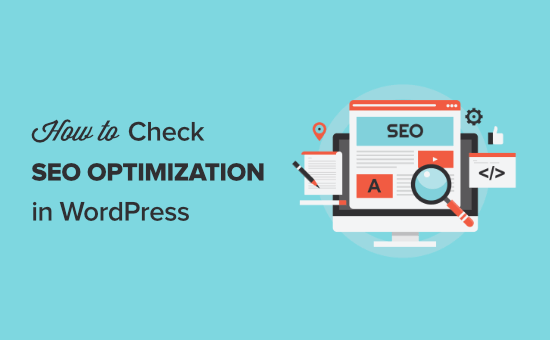
Why Check if Your Website is SEO Optimized?
By checking if your website is SEO optimized, you’ll know if there are any improvements that you can make to grow your search engine traffic.
Since search engines are often the largest source of website traffic, this can be very valuable to your WordPress business website.
However, when it comes to SEO, there’s a lot you need to get right, including a lot of technical SEO jargon that can be confusing for beginners.
Luckily, there are a variety of SEO tools you can use to see if your website is SEO optimized and the steps you can take to improve your SEO.
With that said, let’s look at two ways you can check if your website is SEO-optimized:
Video Tutorial
If you’d prefer written instructions, just keep reading.
Method 1: Use AIOSEO to Check and Optimize Your WordPress SEO
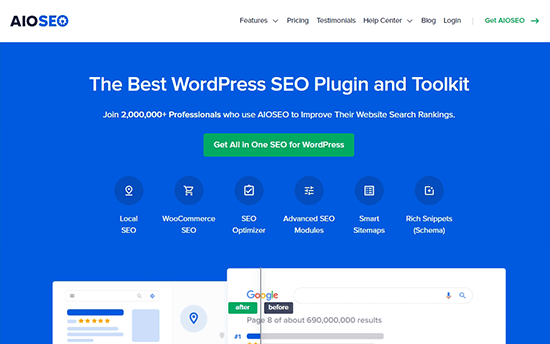
All in One SEO is the best WordPress SEO plugin in the market, used by over 3 million website owners. It lets you easily improve your search engine rankings and optimize your site without having to learn the ins and outs of SEO.
The first thing you need to do is install and activate the plugin. For more details, see our step-by-step guide on how to install a WordPress plugin.
Note: There is a free version of AIOSEO available, but we’ll use the pro version of AIOSEO since it gives us even more SEO optimization features.
Upon activation, you’ll have a new menu item called ‘All in One SEO’. You need to go to All in One SEO » Dashboard, and it will take you to the main settings panel.
After that, click the ‘Launch the Setup Wizard’ button.
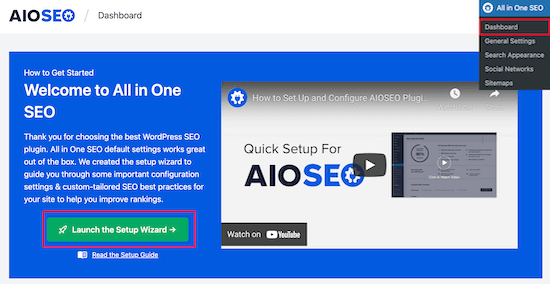
This will walk you through the process of setting up the plugin for your website.
For more details, see our guide on how to set up All in One SEO for WordPress correctly.
Once the plugin is set up, navigate to All in One SEO » SEO Analysis.
The ‘SEO Audit Checklist’ tab will give you a breakdown of your overall SEO score.
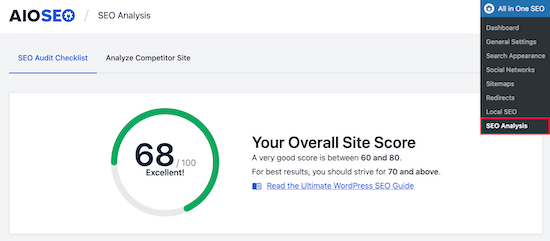
Under that, you’ll see the ‘Complete SEO Checklist’.
You can think of this as your checklist for properly optimizing your WordPress website.
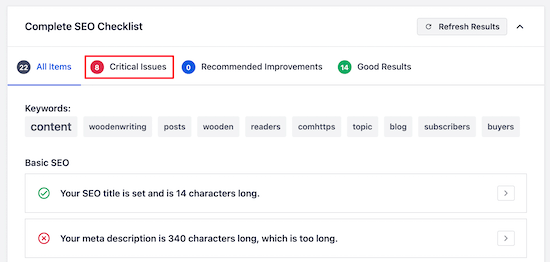
The ‘Critical Issues’ are what you need to fix first because they will have the biggest impact on your SEO score.
Simply click the ‘Arrow’ to the right of an SEO issue, and a box will drop down that explains the problem, and what you can do to fix it.
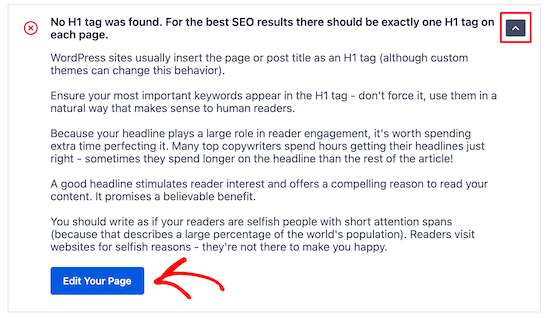
In this case, clicking the blue ‘Edit Your Page’ button will take you to the page where the change needs to be made.
After you make the changes, you need to navigate back to the ‘SEO Analysis’ page and click the ‘Refresh Results’ button.

This will update your results and reflect the positive SEO improvements you have made.
You can see here the red ‘Critical Issue’ has now changed into a green ‘Checkbox’.
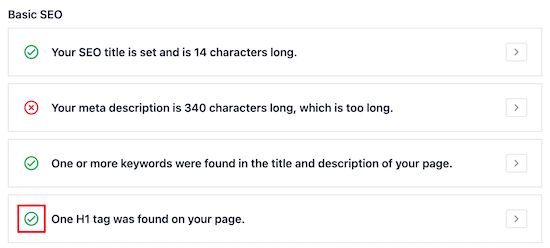
Now, you need to follow the same steps for any of the ‘Critical Issues’ found by the plugin and make the ‘Recommended Improvements’ if there are any suggestions.
Check the SEO of Any Competitor Website
Another great feature is the competitor analyzer that will show you how SEO-optimized are your competitor’s websites.
To use this, you need to go to All in One SEO » SEO Analysis and click the ‘Analyze Competitor Site’ menu item.
Simply enter the competitor URL into the box and click ‘Analyze’.
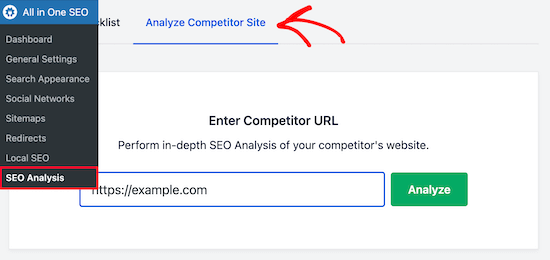
The results you’ll get for your competition are similar to the SEO analysis results for your website.
By seeing what they’re doing right and wrong, you can easily outrank your competition in the search engine results pages.
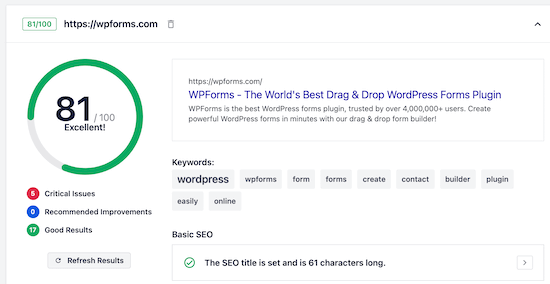
Improve Your Individual Page SEO with TruSEO
Now that you’ve made changes to your website to improve your onsite SEO and fix any errors, the next step is to use the TruSEO analysis feature to see how well your posts and pages are SEO optimized.
Simply open up the post or page that you want to optimize and scroll down to the bottom of the content editor. There you will see the SEO settings area.
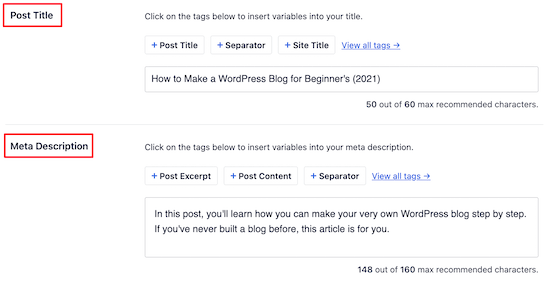
First, you can optimize your ‘Post Title’ and ‘Meta Description’. This is what will be displayed in the search results.
There’s a built-in headline analyzer that will help you maximize your click-through rates to get more traffic.
Next, you can enter your ‘Focus Keyphrase’ into the box.
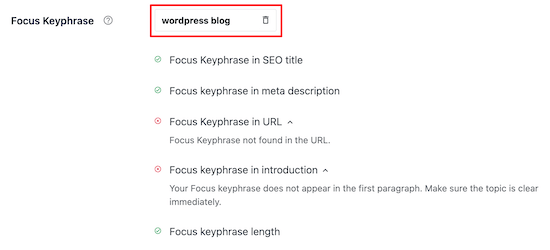
This keyword is what you want the post or page to rank for.
After you enter the keyword, the plugin will analyze your content and give you tips to improve.
You can also enter multiple keywords into the ‘Additional Keyphrases’ box.
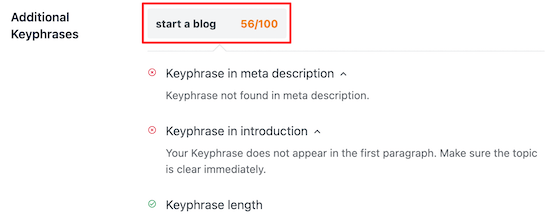
This lets you optimize your content for multiple keywords and bring in even more traffic.
After that, you’ll get a detailed ‘Page Analysis’ that will tell you how well your page is SEO optimized.
The ‘Basic SEO’ tab will tell you how well your content is optimized for common SEO guidelines.
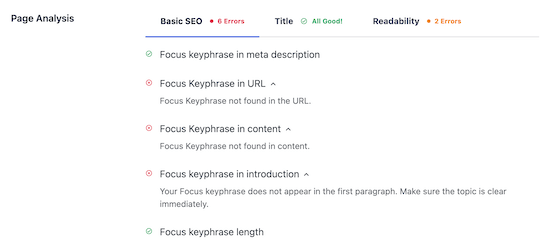
The ‘Title’ tab will tell you how well your title is optimized for search engines.
Click this tab to see how well your title is performing.

Next, you have the ‘Readability’ tab.
This gives you a detailed breakdown of how easy your content is to read. It offers you suggestions to improve your content and tells you what you’re doing well.
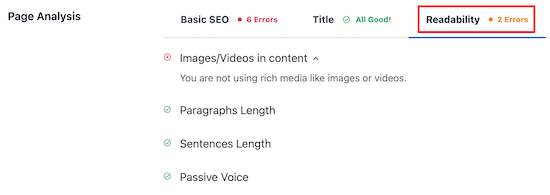
After you’ve finished making changes to optimize your content, make sure you click ‘Update’ or ‘Publish’.
You’ll also notice your TruSEO score in the upper right corner of the page. The higher this number, the better your content is optimized for search engines.
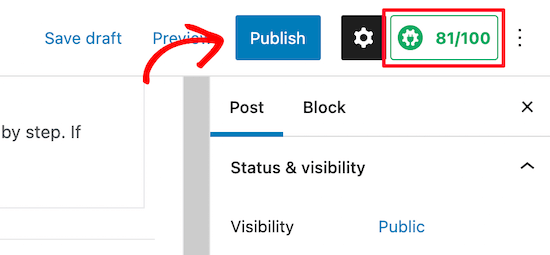
View Search Insights and Track Keywords Inside WordPress
After your WordPress site is SEO-optimized, you’ll want to see if your SEO strategy is working.
Luckily, AIOSEO has recently released a Search Statistics addon that lets you easily view SEO statistics, track your keywords, discover your top-performing content, and more, right from WordPress.
Once you connect Search Statistics with Google Search Console, click on ‘Search Statistics’ under the AIOSEO menu in the WordPress admin dashboard.
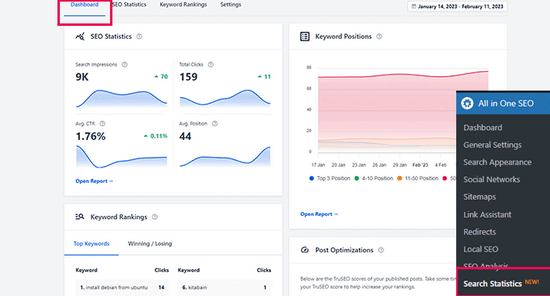
From the Search Statistics dashboard, you can view insights like impressions, total clicks, average click-through rate, and the average position of all your content for the date range you have set.
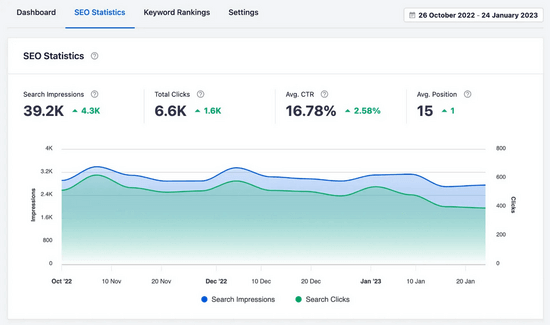
You can also set simple SEO goals, like getting 1-3 articles in the Top 10, and track your progress using easy-to-read reports.
Plus, you can find out what your top-performing keywords are, which can help you come up with ideas for new content to create.
It even shows your ‘top winning’ and ‘top losing’ keywords, which are the keywords that have seen the biggest position changes in search results.
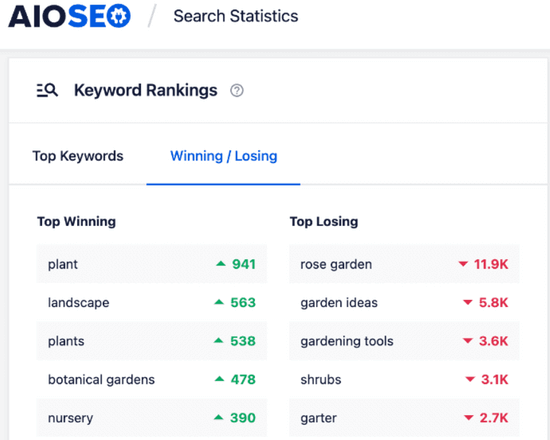
Using this information, you can adjust your SEO strategy to bring your losing keywords back to the top of search results, as well as ensure your winning content continues to rank well.
Method 2: Use Semrush to Get Advanced WordPress SEO Data

Semrush is one of the most popular SEO tools, and they offer the best keyword research tool in the market.
This is the tool that we use for WPBeginner and our other companies. You have to use it along with a WordPress plugin like AIOSEO.
With the help of Semrush, you can see, in great detail, how well your SEO strategy is working.
The first thing you need to do is visit the Semrush website and click ‘Sign Up’ to create an account.
You can create a free account that will give you a limited amount of website SEO data. You will need to sign up for a paid Semrush subscription to get all the features (it’s totally worth it).
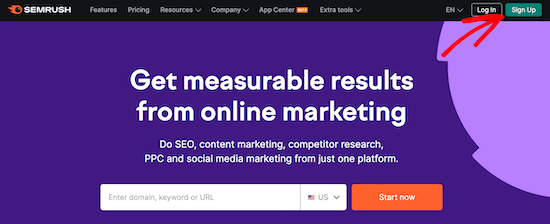
Next, you’ll be asked to provide an email address, password, and phone number.
After that, you’ll be taken to your SEO Dashboard, where you can start checking if your WordPress site is optimized.
The first tool we’ll use is the ‘Site Audit’ feature. This will give you a detailed breakdown of any SEO errors that exist on your website or WordPress blog.
Click on ‘Site Audit’ under the On Page & Tech SEO menu option and then enter your website domain name and click ‘Start Audit’.
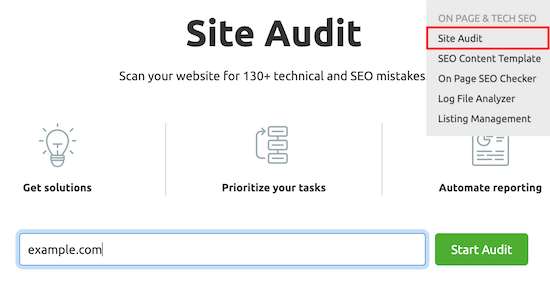
The report will run automatically.
After it’s complete, you’ll get a detailed breakdown of any SEO errors your site has.
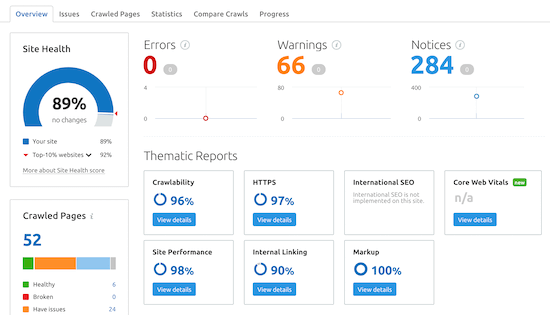
Scroll down until you see the ‘Top Issues’ category, and this will show you the main issues your website has.
You can click to expand any of these areas, and it will show you all the pages that have that issue.
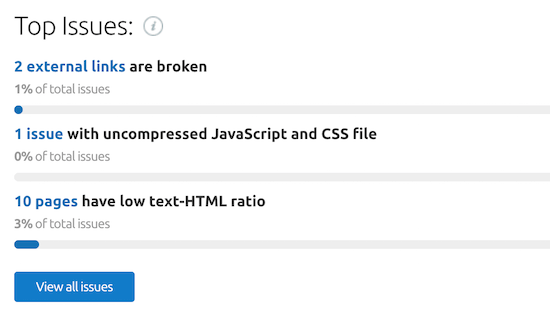
For example, on this website, 2 external links are broken.
If you’re not sure what the problem is or how to fix it, then click the ‘Why and how to fix it’ link.

This will bring up a popup that will describe the issue in-depth.
It’s important to fix all of the ‘Errors’ and ‘Warnings’ that your site has. Fixing these issues alone will go a long way toward improving your SEO.
Uncover Your Backlinks and Advanced Website Analytics
Beyond helping you find and fix technical SEO errors, Semrush is one of the best backlink checker tools.
To use this feature, select ‘Backlink Analytics’ from your SEMRush dashboard and then enter your website URL and click ‘Check it’.
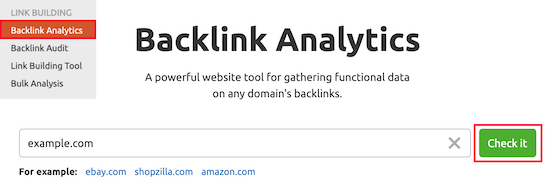
This will bring up lots of information about your domain name and your backlinks.
In general, the more high-quality, relevant backlinks you have pointing toward your website, the higher you will rank in the search engines.
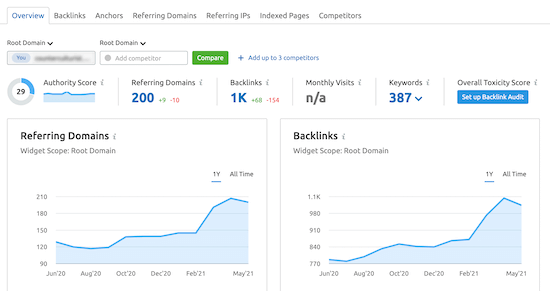
If you click the ‘Backlinks’ menu option, then you’ll see a detailed breakdown of the domain names that are linking to your website.
This can be useful because it can help you pinpoint any issues, such as low-quality links.
You can see the total number of links that a page linking to you has. If it has hundreds of links, then it could be a spammy website.
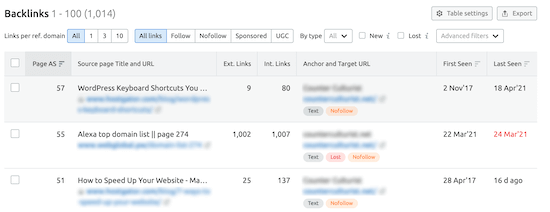
Track Your Traffic and Keyword Rankings Over Time
Another very useful tool is the keyword rank tracking feature. This will let you know if your SEO optimization changes are helping you get more traffic.
Navigate to ‘Organic Research’ in the Competitive Research section of your SEMrush dashboard.
Then, enter your domain name and click ‘Search’.
This screen will give you detailed information about the performance of your website.
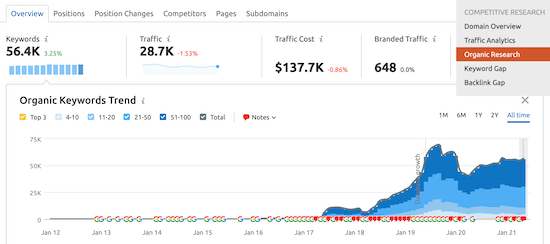
You can click on the ‘Positions’ tab to get an overview of what keywords bring your website the most traffic.
These keywords are the most valuable to your website.
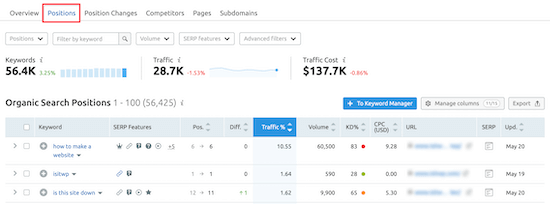
As you optimize your WordPress SEO, you’ll want to pay attention to the ‘Position Changes’ tab.
This will tell you the changes that are happening in the organic search results. As you optimize your website, you should see your website ranking higher for certain keywords and getting more traffic.
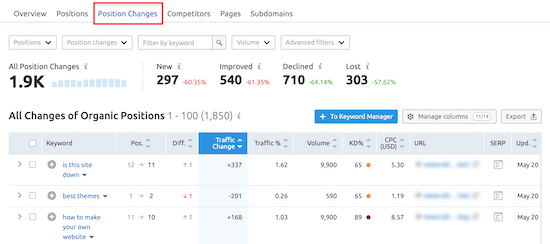
Another useful SEO tool from Semrush is called the SEO Writing Assistant.
This can help you write SEO-optimized content, format your articles, write in a casual tone, and more.
For more details, see our guide on how to use the SEO Writing Assistant in WordPress to improve SEO.
An added bonus is that Semrush seamlessly integrates with AIOSEO to help you find additional related keyphrases right from WordPress.
Simply click on the ‘Get Additional Keyphrases’ button in the AIOSEO settings area of your post or page.
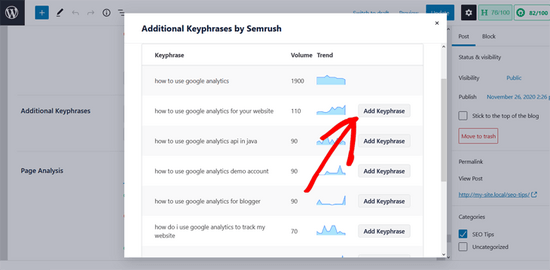
In the popup window, you’ll be prompted to sign in to your Semrush account. Then, you can see a list of additional keywords along with the search volume and trend. You can add any of the keyphrases to your content in 1-click.
We hope this article helped you check if your website is SEO-optimized. You may also want to see our guide on how to increase your blog traffic and our expert pick of the best SEO rank tracker tools.
If you liked this article, then please subscribe to our YouTube Channel for WordPress video tutorials. You can also find us on Twitter and Facebook.





Olaf
I use the lite version of AIO SEO, which offers a relatively good range of tools for basic SEO audits. The browser extension is excellent as it can also provide similar basic information. Semrush is then a secondary tool for extensive SEO audits, offering a wide variety of tools, from keyword analysis to many others. The ability to export results to CSV is fantastic, as we can perform further data analysis to gain additional valuable insights. Semrush is simply a top choice that I love.
Jiří Vaněk
For a quick overview of your SEO on the page, the AIO SEO extension is also great, for example for the Chrome browser. I use this extension now on a daily basis and it’s great.
Teresa Grant
This is great info. thank you. I have Yoast. I try to follow that. Is this info and these plug ins redundant? thank you
WPBeginner Support
AIOSEO is a Yoast alternative that we prefer and SEMRush is not something that Yoast would replace at the moment.
Admin